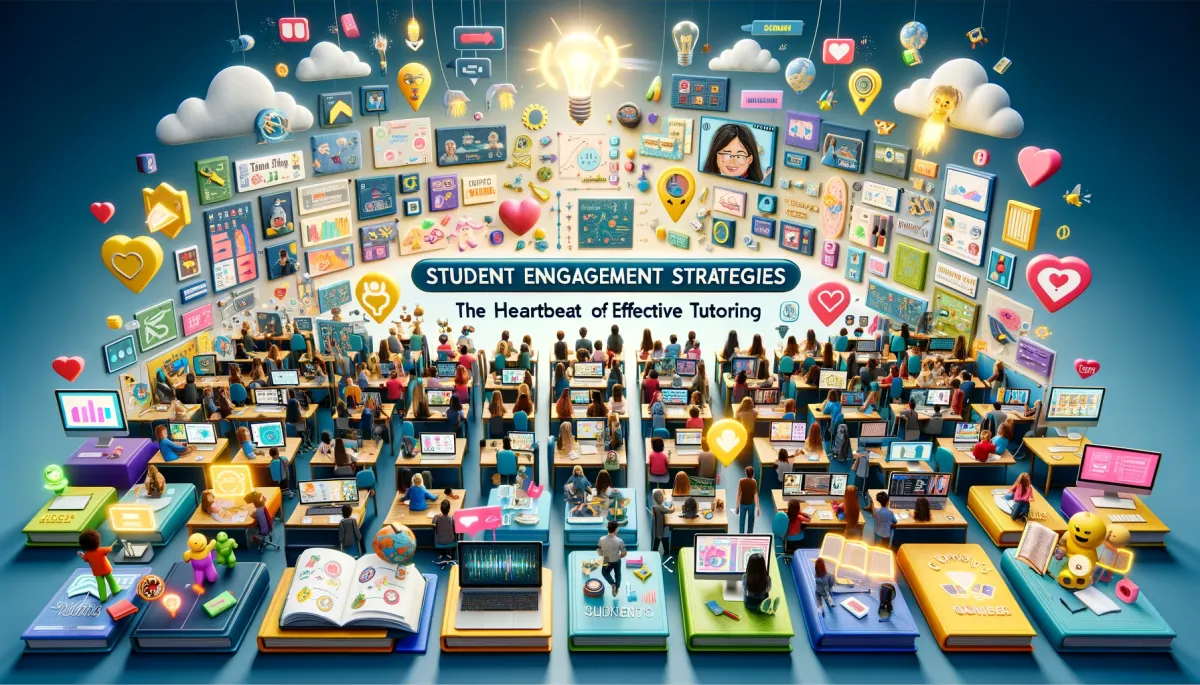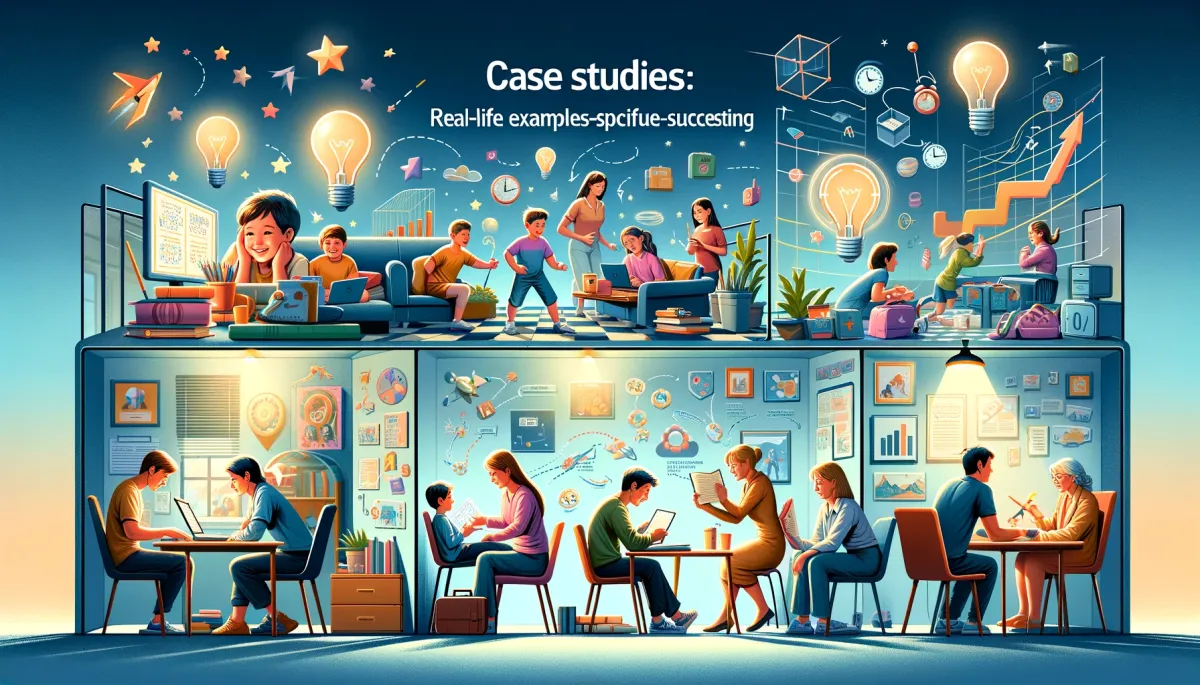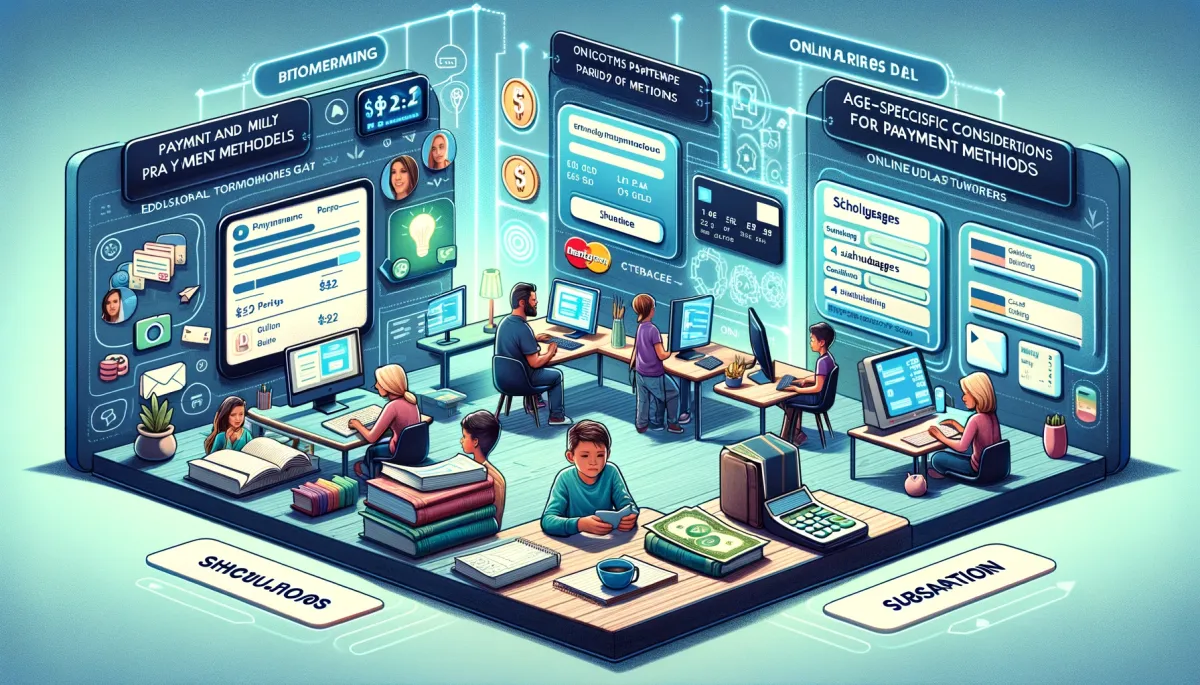Exploring Online Tutoring for Different Age Groups

Fanie Naude
CEO & Founder of Knowledgeable Tutor, Buznet Direct, YMC & Naude Consulting

Fanie Naude
CEO & Founder of Knowledgeable Tutor, Buznet Direct, YMC & Naude Consulting

Introduction: The Art and Science of Age-Specific Online Tutoring
In the digital age, online tutoring has emerged as a versatile and effective educational model. However, one size does not fit all, especially when it comes to different age groups. The pedagogical strategies that engage a high school student may not resonate with a preschooler or a retiree looking to learn a new skill. As the famous educator Maria Montessori said, "The greatest sign of success for a teacher is to be able to say, 'The children are now working as if I did not exist.'" This article aims to equip you, the tutor, with the tools and strategies to make your online tutoring sessions effective across various age groups.
Summary of the Article
- Professional Certifications: The article emphasizes the importance of specialized certifications in subjects like coding, science, or languages for online tutors.
- Time Management: It discusses strategies for effective time management, crucial for both tutors and students.
- Technological Barriers: The article identifies potential tech-related challenges such as digital literacy and internet connectivity.
- Market Growth: It cites that the online tutoring market was valued at USD 4.81 billion in 2019 and is expected to grow at a CAGR of 16.1% from 2020 to 2027.
- Tools and Platforms: The article lists essential tools like interactive whiteboards, video conferencing, and Learning Management Systems (LMS).
- Foundational Skills: It stresses the importance of teaching critical thinking, research skills, and effective study habits.
- Age-Specific Strategies: The article provides real-life examples and stresses the necessity of understanding the unique needs of different age groups.
- Feedback Mechanisms: It discusses various ways to capture age-specific feedback, including social media polls and parental feedback.
- Lesson Planning: The article likens lesson planning to an architectural blueprint, quoting Benjamin Franklin: "By failing to prepare, you are preparing to fail."
- Pricing Strategies: It introduces the concept of age-specific pricing, quoting Warren Buffet: "Price is what you pay. Value is what you get."

The Landscape of Online Tutoring: A Bird's Eye View
Online tutoring is not just a trend; it's a burgeoning industry. According to Grand View Research, the global online tutoring market size was valued at USD 4.81 billion in 2019 and is expected to grow at a compound annual growth rate (CAGR) of 16.1% from 2020 to 2027. This growth is fueled by the increasing penetration of internet services, advancements in technology, and the ongoing COVID-19 pandemic that has accelerated the shift towards online education.
Current Trends in Online Tutoring
- Rise of Specialized Platforms: Websites like Chegg, Wyzant, and Tutor.com offer specialized tutoring services.
- AI and Machine Learning: These technologies are being used to personalize learning experiences.
- Virtual Reality (VR) and Augmented Reality (AR): Emerging technologies that offer immersive learning experiences.
Statistics: The Numbers Speak
- Demographics: The age group of 16-25 years is the most active in seeking online tutoring services.
- Subjects: Math and Science are the most sought-after subjects, followed by languages.
- Global Reach: North America and Asia-Pacific regions are leading in the adoption of online tutoring.

Why Age Matters in Online Tutoring
Understanding the developmental and psychological aspects of learning is crucial when tutoring different age groups. For instance, younger children have shorter attention spans and require more interactive and engaging methods. On the other hand, adult learners may be more self-directed but could face challenges in adapting to new technologies.
Psychological Factors
- Cognitive Development: Varies significantly between children, adolescents, and adults.
- Motivation: Younger students may be extrinsically motivated (grades, parental approval), while adults are often intrinsically motivated (career advancement, personal growth).
Developmental Milestones
- Early Childhood: Focus on basic literacy and numeracy.
- Adolescence: Development of critical thinking and problem-solving skills.
- Adulthood: Often focused on specialized skills and lifelong learning.
By understanding these nuances, you can tailor your tutoring approach to meet the unique needs of each age group, thereby enhancing the effectiveness of your teaching methods. As you navigate through this comprehensive guide, you'll gain insights into age-specific strategies, tools, and best practices that will empower you to become an exceptional online tutor for students of all ages.

Online Tutoring for Pre-Schoolers: The Dawn of Digital Learning
When it comes to tutoring pre-schoolers online, the challenges are unique but not insurmountable. The key lies in understanding the developmental stage of the child and adapting your teaching methods accordingly. As Jean Piaget, the Swiss psychologist known for his work on child development, aptly said, "Play is the work of childhood."
Strategies for Engaging Pre-Schoolers
- Interactive Storytelling: Use digital storybooks to make learning fun.
- Visual Aids: Incorporate colorful graphics and animations.
- Music and Rhymes: Utilize songs to teach basic concepts like numbers and alphabets.
Tools for Online Tutoring of Pre-Schoolers
- Interactive Whiteboards: Platforms like Ziteboard offer child-friendly interfaces.
- Educational Apps: Apps like ABCmouse are designed for early learners.
- Virtual Classroom Platforms: Websites like ClassDojo offer features suitable for younger students.
For a deeper dive into the tools and technology that can make your online tutoring sessions more effective, refer to our guide on Tools and Technology for Effective Online Tutoring.

Online Tutoring for Elementary School Students: Building the Foundation
Elementary school students are at a stage where foundational skills in subjects like Math, Science, and Language Arts are being laid. Effective online tutoring at this stage can set the tone for future academic success. As the saying goes, "A good education is a foundation for a better future."
Subject-Specific Strategies
- Math: Use interactive puzzles and games to teach basic arithmetic.
- Science: Virtual labs and interactive experiments can make science fascinating.
- Language Arts: Reading comprehension exercises and creative writing prompts can enhance language skills.
Engagement Tools for Elementary Students
- Gamification: Platforms like Kahoot! make learning interactive and fun.
- Interactive Quizzes: Tools like Quizizz offer subject-specific quizzes.
- Collaborative Learning: Platforms like Padlet allow students to collaborate on projects online.
For more insights into maintaining student engagement, you might find our article on Maintaining Student Engagement in Online Tutoring particularly useful.
In both these age groups, the focus should be on making learning a delightful experience. The tools and strategies may differ, but the goal remains the same: to foster a love for learning and lay a strong educational foundation.

Online Tutoring for Middle School Students: The Crucial Transition
Middle school is a pivotal phase in a student's academic journey, often marked by a shift from general education to more subject-specific learning. It's a time when students begin to develop their academic interests and preferences. As educational philosopher John Dewey once said, "Education is not preparation for life; education is life itself."
Focus on Building Foundational Skills
- Critical Thinking: Encourage problem-solving through real-world scenarios.
- Research Skills: Introduce basic research methods and the importance of credible sources.
- Study Habits: Teach effective note-taking, summarization, and time management.
Subject-Specific Tutoring
- Math: Introduce algebraic concepts and geometry through interactive modules.
- Science: Focus on scientific reasoning through experiments and case studies.
- Humanities: Explore history and literature through discussions and debates.
For more on subject-specific tips and techniques, consider reading our comprehensive guide on Teaching Different Subjects: Tips and Techniques.

Online Tutoring for High School Students: The Gateway to Higher Education
High school is a critical period where students are not just learning subject-specific content but are also preparing for college and, eventually, their careers. As Benjamin Franklin wisely stated, "An investment in knowledge pays the best interest."
Preparing for College
- Advanced Courses: Offer tutoring in AP or IB courses to give students a head start.
- College Admissions: Provide guidance on college essays and applications.
- Test Prep: SAT, ACT, and other standardized test preparation.
A Balanced Approach: Academics and Life Skills
- Soft Skills: Teach communication, leadership, and emotional intelligence.
- Career Guidance: Offer insights into different career paths and the necessary academic preparation.
- Financial Literacy: Basic understanding of budgeting, taxes, and investments.
For those looking to balance tutoring with personal life, our article on Balancing Tutoring with Your Personal Life offers valuable insights.
In summary, middle school and high school are transformative years that require a balanced and nuanced approach to online tutoring. While the subjects become more complex, the emotional and psychological needs of the students also evolve. Tailoring your tutoring methods to meet these diverse needs can make a significant difference in the students' academic journey.

Online Tutoring for College Students: Navigating the Academic Labyrinth
College students are often juggling a multitude of responsibilities, from rigorous academic courses to part-time jobs and extracurricular activities. Online tutoring for this demographic needs to be highly specialized and flexible. As Albert Einstein once said, "Education is not the learning of facts, but the training of the mind to think."
Specialized Subjects and Advanced Tutoring Techniques
- STEM Fields: Offer tutoring in complex subjects like calculus, organic chemistry, and programming.
- Humanities and Social Sciences: Focus on critical analysis, research methodologies, and academic writing.
- Professional Courses: Provide guidance in subjects like business management, law, and healthcare.
Tools and Resources
- Academic Journals: Introduce students to databases like JSTOR and PubMed for research.
- Project Management Tools: Teach the use of tools like Asana or Trello for managing academic projects.
- Advanced Software: For STEM students, introduce software like MATLAB or AutoCAD.
For more on qualifications and certifications that can boost your credibility in tutoring specialized subjects, visit our guide on Qualifications for Becoming an Online Tutor.

Online Tutoring for Adults: The Quest for Lifelong Learning
Adult learners are a diverse group, ranging from professionals looking to upskill to individuals pursuing hobbies or even a second career. The focus here is on lifelong learning and career development. As Malcolm X eloquently put it, "Education is the passport to the future, for tomorrow belongs to those who prepare for it today."
Lifelong Learning
- Skill Development: Offer courses in soft skills like communication, leadership, and negotiation.
- Career Transition: Provide guidance for adults looking to switch careers, including resume building and interview preparation.
- Hobbies and Interests: Tutoring in areas like music, art, or cooking can also be lucrative.
Career Development
- Certification Courses: Guide adults through industry-specific certifications.
- Networking: Teach the importance of professional networking and personal branding.
- Advanced Technical Skills: Offer courses in specialized software relevant to their field.
For adults who are balancing multiple responsibilities, effective time management is crucial. Our article on Effective Time Management Strategies for Online Tutors offers actionable tips.
Both college students and adults require a more specialized approach to online tutoring, given their specific needs and goals. Whether it's mastering a complex subject or transitioning careers, the tutoring strategies must be tailored to meet these diverse requirements.

Online Tutoring for Seniors: The Golden Years of Learning
The senior demographic is often overlooked in the context of online tutoring, yet they represent a unique and rewarding audience. As George Bernard Shaw once said, "We don't stop playing because we grow old; we grow old because we stop playing." In the same vein, learning should never cease, regardless of age.
Cognitive Benefits and Social Engagement
- Mental Exercise: Tutoring can serve as a cognitive workout, helping to keep the mind sharp.
- Social Interaction: Online tutoring provides an avenue for social engagement, combating loneliness.
- Tech-Savviness: Introduce seniors to basic technology, enhancing their digital literacy.
Subjects and Interests
- History and Culture: Many seniors enjoy learning about history, art, and culture.
- Health and Wellness: Offer courses on nutrition, exercise, and mental well-being.
- Hobbies: Whether it's gardening, painting, or writing, hobbies keep the mind and body active.
For more on creating a safe and comfortable online learning environment, particularly important for seniors, you may refer to our guide on Creating a Safe and Comfortable Online Learning Environment.

Age-Specific Challenges in Online Tutoring: The Hurdles and How to Overcome Them
Every age group comes with its own set of challenges, be it technological barriers, varying attention spans, or different learning styles. As the saying goes, "A smooth sea never made a skilled sailor." Overcoming these challenges is part and parcel of effective online tutoring.
Technological Barriers
- Digital Literacy: While younger generations may be tech-savvy, older age groups might struggle.
- Internet Connectivity: Ensure that students have a stable internet connection for uninterrupted learning.
- Platform Usability: The tutoring platform should be user-friendly for all age groups.
Attention Span and Learning Styles
- Younger Students: They often have shorter attention spans, requiring interactive and engaging teaching methods.
- Adult Learners: They may prefer self-paced learning and practical applications of knowledge.
- Seniors: Patience and repetition are key, as they may take longer to grasp new concepts.
For more insights into overcoming challenges in online tutoring, our article on The Challenges of Online Tutoring and How to Overcome Them is a valuable resource.
Addressing the unique challenges that come with each age group is crucial for a successful online tutoring experience. From technological hurdles to varying attention spans, being prepared to tackle these issues head-on sets the stage for effective and rewarding tutoring sessions.

The Role of Technology: The Digital Backbone of Age-Specific Tutoring
In the digital age, technology is not just an add-on but the backbone of effective online tutoring. As Bill Gates aptly stated, "Technology is just a tool. In terms of getting the kids working together and motivating them, the teacher is the most important." The same holds true for online tutoring across various age groups.
Tools and Platforms
- Interactive Whiteboards: Essential for visual learning, especially for younger students.
- Video Conferencing: Enables face-to-face interaction, crucial for building rapport.
- Learning Management Systems (LMS): Streamlines course material, assignments, and feedback.
Age-Specific Tech Features
- Gamification for Younger Students: Platforms with built-in games can make learning fun.
- Advanced Analytics for Adults: Older students may appreciate detailed progress tracking.
- Ease of Use for Seniors: Platforms should be intuitive and easy to navigate for older learners.
For an in-depth look at the technology that can make your online tutoring more effective, consider our guide on Tools and Technology for Effective Online Tutoring.

Marketing Strategies for Different Age Groups: The Art of Attraction
Marketing is an art and a science, especially when targeting diverse age groups. As Philip Kotler said, "Marketing is not the art of finding clever ways to dispose of what you make. It is the art of creating genuine customer value." Tailoring your marketing strategies to different age groups can create that value.
Social Media and Younger Audiences
- Instagram and TikTok: These platforms are popular among younger audiences.
- Interactive Content: Polls, quizzes, and challenges can engage younger students.
Professional Networks and Adult Learners
- LinkedIn and Webinars: These platforms are more suited for professionals and adult learners.
- Case Studies and Whitepapers: These can attract a more academic audience.
Community Outreach for Seniors
- Local Community Centers: Seniors are more likely to engage through community centers and word-of-mouth.
- Print Media: Newspapers and flyers can be effective for older demographics.
To master the art of attracting students from various age demographics, delve into our comprehensive guide on Marketing Yourself as an Online Tutor.
In the realm of online tutoring, technology and marketing are two sides of the same coin. While technology provides the platform for effective learning, targeted marketing strategies ensure that your services reach the right audience. Tailoring both to suit different age groups can significantly elevate the quality and reach of your online tutoring services.

Pricing Your Services: The Economics of Age-Specific Tutoring
The art of pricing is a delicate balance between value and affordability. As Warren Buffet wisely said, "Price is what you pay. Value is what you get." In the context of online tutoring, age-specific pricing strategies can make a world of difference.
Tiered Pricing Model
- Younger Students: Lower rates but with bundled packages that include interactive activities.
- High School and College Students: Moderate pricing with options for specialized subjects or test prep.
- Adults and Professionals: Premium pricing for specialized courses, career development, or professional certifications.
Discounts and Scholarships
- Early Bird Discounts: For younger students during summer breaks.
- Bulk Session Discounts: For high school and college students preparing for exams.
- Corporate Discounts: For adults seeking professional development.
For a nuanced understanding of how to price your online tutoring services, consult our guide on Online Tutoring Rates: How to Price Your Services.

Lesson Planning for Different Ages: The Blueprint of Success
Lesson planning is the architectural blueprint of successful tutoring. As Benjamin Franklin once said, "By failing to prepare, you are preparing to fail." Tailoring your lesson plans to suit different age groups can be a game-changer.
Templates and Tools
- Interactive Templates for Younger Students: Use colorful and interactive templates to engage younger minds.
- Structured Templates for Older Students: High school and college students may benefit from a more structured, syllabus-oriented approach.
- Flexible Templates for Adults: Adults may prefer a more flexible, topic-based approach.
Content Customization
- Visual Aids for Younger Students: Incorporate more images, videos, and interactive elements.
- Text and Data for Older Students: High school and college students may require more textual content and data analysis.
- Case Studies for Adults: Real-world examples can make the learning more relatable for adults.
For a deep dive into creating effective lesson plans tailored to different age groups, refer to our guide on Creating Effective Lesson Plans for Online Tutoring.
In summary, pricing and lesson planning are integral components of your online tutoring business. While age-specific pricing strategies can attract a wider demographic, tailored lesson plans can enhance the learning experience for each age group. Both elements are crucial for delivering value to your students and achieving long-term success in the competitive field of online tutoring.

Student Engagement Strategies: The Heartbeat of Effective Tutoring
"Tell me and I forget, teach me and I may remember, involve me and I learn," said Benjamin Franklin. Engagement is the heartbeat of effective tutoring, and age-specific strategies can amplify this heartbeat into a symphony of learning.
Gamification
- Younger Students: Use game-based learning apps to make learning fun.
- Middle School Students: Introduce point systems or badges for completing tasks.
- Older Students: Use real-world simulations or case studies as games.
Interactive Sessions
- Younger Students: Use interactive storytelling or puppet shows.
- Middle and High School Students: Incorporate quizzes, polls, and interactive discussions.
- Adults: Use real-world scenarios for problem-solving exercises.
For more on maintaining student engagement across different age groups, delve into our comprehensive guide on Maintaining Student Engagement in Online Tutoring.

Ethical Considerations: The Compass of Tutoring
Ethics is the compass that guides us through the complex landscape of online tutoring. As Immanuel Kant said, "Act in such a way that you treat humanity, whether in your own person or in the person of any other, always at the same time as an end and never merely as a means to an end."
Privacy Measures
- Younger Students: Ensure parental controls and secure platforms.
- Teenagers: Use platforms compliant with the Children's Online Privacy Protection Act (COPPA).
- Adults: Ensure data encryption and confidentiality agreements.
Safety Measures
- Younger Students: Use platforms with built-in safety features like content filters.
- Older Students: Ensure secure login mechanisms and two-factor authentication.
- Adults: Use platforms that offer secure payment gateways and encrypted data storage.
For a comprehensive understanding of ethical considerations in online tutoring, refer to our guide on Ethical Practices in Online Tutoring.
In essence, student engagement and ethical considerations are non-negotiable elements in the realm of online tutoring. While engagement strategies can vary based on the age group, ethical considerations remain a constant across all ages. Both are pivotal in shaping a tutoring experience that is not just effective but also responsible and secure.

Qualifications and Certifications: The Cornerstones of Credibility
As the renowned educator John Dewey once said, "Education is not preparation for life; education is life itself." The qualifications and certifications you hold as a tutor are not just pieces of paper; they are the cornerstones that build your credibility and expertise.
For Younger Students
- Early Childhood Education Certificates: Specialized training in early childhood development is crucial.
- Subject-Specific Certifications: For subjects like Math or English, specialized certifications can add value.
For Older Students
- Advanced Degrees: A Master's or PhD can be a significant advantage, especially for high school and college students.
- Professional Certifications: Certifications in specialized subjects like coding, science, or languages can set you apart.
For a deeper dive into what qualifications matter the most in online tutoring, explore our guide on Qualifications for Becoming an Online Tutor.

Time Management Strategies: The Art of Juggling
"Time is what we want most, but what we use worst," said William Penn. In the realm of online tutoring, managing time effectively is akin to mastering the art of juggling.
For Tutoring Younger Students
- Shorter Sessions: Younger minds have shorter attention spans. Keep sessions brief but impactful.
- Frequent Breaks: Incorporate short breaks to keep the child engaged and attentive.
For Tutoring Older Students
- Longer, In-Depth Sessions: Older students can handle longer sessions that dive deep into subjects.
- Time for Revision: Allocate time for revision and Q&A to ensure the student grasps the subject matter.
For more on this, read our guide on Effective Time Management Strategies for Online Tutors.
Qualifications and time management are like the two wheels of a bicycle; one can't move effectively without the other. While qualifications provide the necessary momentum, effective time management ensures that you're steering in the right direction. Both are indispensable for a successful online tutoring career.

Feedback Mechanisms: The Mirror of Educational Efficacy
As the great philosopher Socrates proclaimed, "An unexamined life is not worth living." In the context of online tutoring, an unexamined teaching strategy is not worth implementing. Feedback serves as the mirror that reflects the efficacy of your educational methods.
For Younger Students
- Visual Feedback: Use emojis or stickers to make the feedback more relatable.
- Parent-Teacher Conferences: Regularly update parents on their child's progress.
For Older Students
- Detailed Written Feedback: Older students can appreciate the nuances of written feedback.
- Interactive Reviews: Use quizzes or interactive platforms to gauge understanding.
For a comprehensive understanding of age-appropriate feedback mechanisms, delve into our guide on How to Give Effective Feedback to Online Students.

Parental Involvement: The Unseen Pillar of Success
The African proverb, "It takes a village to raise a child," rings true in the realm of online tutoring. Parental involvement serves as an unseen but sturdy pillar that supports the educational edifice.
For Younger Students
- Active Participation: Parents should be present during sessions to assist with technology and materials.
- Homework Help: Parents can reinforce what was taught during the tutoring session.
For Older Students
- Progress Tracking: Parents should be kept in the loop about academic progress and upcoming milestones.
- Emotional Support: Older students still benefit from the emotional and motivational support that parents can offer.
For more insights into the role of parents in online tutoring, consult our guide on Communicating Effectively with Parents of Students.
Feedback and parental involvement are interconnected. While feedback provides the roadmap for academic improvement, parental involvement ensures that the journey is well-supported and meaningful. Both are essential for a holistic educational experience across all age groups.

Case Studies: Real-Life Examples of Successful Age-Specific Online Tutoring
In the realm of online tutoring, age-specific strategies are not just a pedagogical choice; they are a necessity. The efficacy of online tutoring is often determined by how well the tutor understands the unique needs of different age groups. Let's delve into some real-life examples that illuminate the success of age-specific online tutoring.
Real-Life Example 1: Algorithmic Matching for Instant Tutoring
An intriguing case comes from a company that employs an algorithm to match students with tutors within 30 seconds, according to their marketing materials. This is particularly beneficial for younger students who may have shorter attention spans and are more impulsive in their learning needs. The quick matching ensures that the student is engaged right from the get-go. For more details, you can read about it here.
Real-Life Example 2: ESL Tutoring Tips for Success
Another example focuses on ESL (English as a Second Language) tutoring, where the tutor shares 7 tips for success. These tips are age-specific, considering the different ways children and adults learn a new language. The tutor emphasizes real-life interactions, which are crucial for language learning at any age but are implemented differently depending on the age group. Learn more about these tips here.
Key Takeaways from Real-Life Examples
- Algorithmic Matching: Useful for engaging younger students immediately.
- ESL Tutoring Tips: Age-specific strategies for effective language learning.
Success Stories: The Learning Academy
The Learning Academy outlines 8 key characteristics of a great tutor, one of which is the ability to use real-life references and examples in lessons. This is particularly important for older students and adults who can relate the subject matter to their own experiences, thereby enhancing comprehension and retention. You can read more about these characteristics here.
"The mediocre teacher tells. The good teacher explains. The superior teacher demonstrates. The great teacher inspires." - William Arthur Ward
For more insights into the world of online tutoring, you may find our guide on Exploring Online Tutoring for Different Age Groups to be a valuable resource.

Reviews and Testimonials: The Importance and Methods to Gather Age-Specific Reviews
In the digital age, reviews and testimonials serve as the lifeblood of any online service, including tutoring. Gathering age-specific reviews can offer potential students and their parents a more nuanced understanding of how effective your tutoring services are for different age groups.
Why Age-Specific Reviews Matter
- Credibility: Reviews from peers or similar age groups add an extra layer of trust.
- Personalization: Helps potential clients understand how you cater to specific age-related needs.
- Feedback Loop: Allows you to improve your services based on age-specific feedback.
Methods to Gather Age-Specific Reviews
- Post-Session Surveys: Tailor your questions to capture age-specific feedback.
- Social Media Polls: Use platforms popular among different age groups to gather reviews.
- Parental Feedback: For younger students, parental feedback is invaluable.
"Your reputation is more important than your paycheck, and your integrity is worth more than your career." - Ryan Freitas, co-founder of About.me
For a comprehensive look at gathering reviews and testimonials, you may refer to our guide on How to Ask for Reviews and Testimonials from Students.

Payment and Invoicing: Age-Specific Considerations for Payment Methods
In the labyrinth of online tutoring, the payment process should be as straightforward as possible. However, age-specific considerations can add layers of complexity that tutors must navigate with finesse.
Payment Preferences Across Age Groups
- Younger Students: Parents usually handle payments. Opt for methods that offer parental controls.
- High School and College Students: Digital wallets and online transfers are popular.
- Adults and Seniors: A mix of traditional (credit cards, bank transfers) and modern (digital wallets) methods.
Payment Gateways and Platforms
- PayPal: Offers parental controls, widely used.
- Stripe: Allows for more customized payment solutions.
- Bank Transfers: Preferred by older adults for its familiarity.
"Price is what you pay. Value is what you get." - Warren Buffett
For a more comprehensive understanding of pricing and payment methods, you may refer to our guide on How to Handle Payment and Invoicing for Your Tutoring Services.
Invoicing: The Art of Detailing Services
- Itemized Invoices: Break down the services offered, especially beneficial for parents who want to understand what they are paying for.
- Recurring Invoices: Useful for long-term students, saves time for both parties.
- Late Fee Specifications: Important for adult students who may be juggling multiple responsibilities.
Invoicing Software
- FreshBooks: Offers customization and is user-friendly.
- QuickBooks: Provides comprehensive financial reports.
- Zoho Invoice: Free for small businesses, offers automation features.

Mental Health and Well-being: Managing Stress and Burnout While Tutoring Multiple Age Groups
The role of a tutor is akin to a juggler, balancing multiple balls in the air. However, the stakes are higher; the balls are the mental and emotional well-being of both the tutor and the student.
Stress Management Techniques
- Mindfulness: Incorporate mindfulness techniques between sessions.
- Physical Exercise: A 20-minute walk can significantly reduce stress levels.
- Professional Help: Don't hesitate to consult a mental health professional for persistent stress.
"It's not stress that kills us; it is our reaction to it." - Hans Selye
For maintaining mental equilibrium while tutoring, our guide on Maintaining Your Mental Health as an Online Tutor can be a valuable resource.
Burnout Indicators and Prevention
- Emotional Exhaustion: Feeling drained after sessions.
- Reduced Performance: A noticeable decline in the quality of tutoring.
- Cynicism: A growing sense of detachment from your work.
Preventive Measures
- Scheduled Breaks: Plan short breaks during the day and longer breaks during the month.
- Peer Support: Engage in forums or groups with other tutors to share experiences and solutions.
- Professional Development: Keep learning to break the monotony and stay engaged.
In the realm of online tutoring, mental health is not a sidebar; it's a headline. Addressing it is not a sign of weakness but a hallmark of a comprehensive, age-specific tutoring strategy.

Future Trends: AI, VR, and Other Technologies Shaping the Future of Age-Specific Online Tutoring
As we stand on the precipice of the Fourth Industrial Revolution, the landscape of online tutoring is poised for seismic shifts. Technologies like Artificial Intelligence (AI), Virtual Reality (VR), and Augmented Reality (AR) are not just buzzwords; they are the building blocks of future educational paradigms.
AI in Tutoring
- Personalized Learning: AI algorithms can analyze student performance and tailor lessons accordingly.
- Automated Administrative Tasks: AI can handle scheduling, reminders, and even basic queries, freeing tutors to focus on teaching.
"The best way to predict the future is to invent it." - Alan Kay
For a more in-depth look at how technology is revolutionizing online tutoring, explore our guide on Future of Online Tutoring: Trends to Watch.
VR and AR in Tutoring
- Immersive Learning: VR can create lifelike simulations for subjects like history or science.
- Interactive Lessons: AR can turn a simple textbook into an interactive 3D experience.
Technologies on the Horizon
- Blockchain: For secure and transparent credential verification.
- IoT: Internet of Things can make the learning environment more interactive.

FAQs: Navigating the Complexities of Age-Specific Online Tutoring
The intricacies of age-specific online tutoring often give rise to a multitude of questions. These questions span the spectrum from the qualifications needed for tutoring different age groups to the technological requirements for effective online education. Below, we delve into some of the most frequently asked questions, offering insights that aim to dispel uncertainties.
Questions Pertaining to Tutors
What qualifications do I need to tutor different age groups?
- Answer: The qualifications can vary depending on the educational level you are targeting. For pre-school and elementary levels, a bachelor's degree in education or a related field is often sufficient. For high school and college levels, a master's degree or higher in the specific subject area is usually required. Certifications like TESOL or TEFL can also be beneficial.
How do I handle students with special needs?
- Answer: Specialized training in special education is crucial. Familiarize yourself with Individualized Education Programs (IEPs) and make use of assistive technologies.
What are the best platforms for online tutoring?
- Answer: The "best" platform can vary based on your specific needs. However, platforms that offer interactive whiteboards, video conferencing, and resource sharing are generally more effective. For a comprehensive comparison, visit our Understanding Different Online Tutoring Platforms guide.
"He who asks a question is a fool for five minutes; he who does not ask a question remains a fool forever." - Chinese Proverb
Questions from Students and Parents
How do I know if the tutor is qualified?
- Answer: Always ask for credentials, and if possible, look for verified reviews or testimonials. Some platforms also offer background checks.
What are the safety measures in place for online tutoring?
- Answer: Reputable platforms have stringent safety protocols, including encrypted communications and secure payment gateways. Always ensure the platform complies with privacy laws like GDPR or COPPA.
How can I be involved in my child's online tutoring?
- Answer: Many platforms offer parental controls and monitoring features. Regular communication with the tutor is also essential for tracking progress.
Is online tutoring as effective as in-person tutoring?
- Answer: Studies have shown that online tutoring can be just as effective, if not more so, due to the convenience and availability of resources. However, the effectiveness can vary based on the student's learning style and the tutor's expertise.
How is progress measured in online tutoring?
- Answer: Progress is often measured through regular assessments, quizzes, and feedback sessions. Some platforms offer analytics and progress tracking features.
What if the tutoring session is not going well?
- Answer: Most platforms offer a "trial period" or a money-back guarantee for such instances. Open communication with the tutor for course correction is also advisable.
Additional Resources for FAQs
- Webinars: These are excellent for deep-diving into complex issues.
- Community Forums: A space for sharing experiences and solutions.
- Customer Support: Specialized support lines for different age groups offer targeted assistance.
The realm of age-specific online tutoring is a labyrinth of possibilities and challenges. However, armed with the right information, navigating this labyrinth becomes not just feasible, but also enlightening.

Additional Resources: The Treasure Trove for Age-Specific Online Tutoring
In the realm of online tutoring, knowledge is indeed power. The more resources you have at your disposal, the better equipped you are to navigate the complexities of age-specific tutoring. Here are some invaluable resources that can elevate your tutoring game:
- Books: Titles like "The Art of Online Teaching" and "Digital Classroom Strategies" offer in-depth insights into the nuances of online education.
- Courses: Platforms like Coursera and Udemy offer specialized courses on online tutoring techniques, often tailored for different age groups.
- Websites: Blogs and educational websites often publish articles and guides on effective tutoring strategies. Our own Useful Resources for Online Tutors is a curated list of such resources.
- Webinars: These are excellent platforms for real-time learning and interaction with experts in the field.
- Forums and Communities: Online communities offer a space for tutors to share experiences, ask questions, and find solutions to common challenges.
"An investment in knowledge pays the best interest." - Benjamin Franklin
Table: Recommended Resources by Age Group
| Age Group | Recommended Book | Recommended Course | Recommended Website |
|---|---|---|---|
| Pre-Schoolers | Early Childhood Education | Pre-School Tutoring 101 | TinyTutor.com |
| Elementary School Students | The Elementary Tutor | Elementary Tutoring | KidSmart.edu |
| Middle School Students | The Middle School Mind | Middle School Mastery | TweenTutor.com |
| High School Students | High School Tutoring | SAT/ACT Prep | HighSchoolTutorHub.com |
| College Students | College Tutoring Mastery | Advanced Tutoring Methods | CollegeTutorOnline.com |
| Adults | Lifelong Learning | Career Development | AdultLearn.com |
| Seniors | Tutoring for Seniors | Cognitive Training | SeniorSmartTutor.com |

Conclusion: The Final Act in the Symphony of Age-Specific Online Tutoring
As we reach the finale of this comprehensive guide, it's crucial to remember that age-specific online tutoring is not a monolithic entity but a dynamic landscape. It's a symphony where each age group plays a different instrument, contributing to a harmonious educational experience. The key is to adapt, evolve, and continually refine your strategies to meet the unique needs of each age group.
"The only constant in life is change." - Heraclitus
From understanding the psychological factors that affect learning to leveraging technology for enhanced engagement, each aspect is a note in this grand composition. And as you navigate through the complexities, resources like Future of Online Tutoring: Trends to Watch can serve as your compass, guiding you through the ever-changing terrain.
So, go forth and make your mark in the world of age-specific online tutoring. The future is not just bright; it's dazzling with possibilities.

